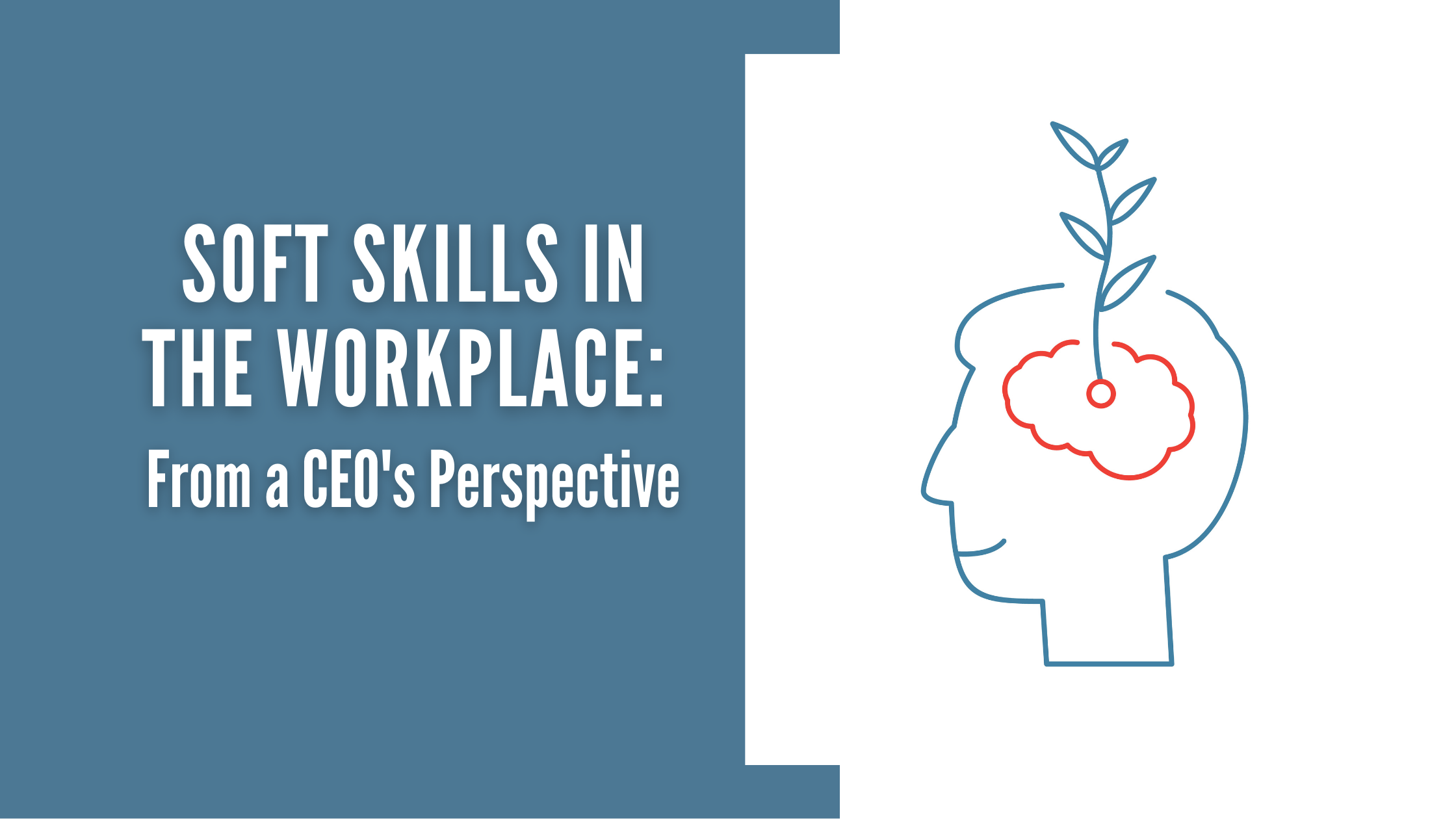 Every employee or prospective employee you have ever crossed paths with has a set of skills that can be broken down into two key categories: soft skills and hard skills. But as you hire people and build your business, which should you value more? While hard skills are the basics that will determine whether an employee can do the job, soft skills in the workplace can make the difference between an employee and a leader.
Every employee or prospective employee you have ever crossed paths with has a set of skills that can be broken down into two key categories: soft skills and hard skills. But as you hire people and build your business, which should you value more? While hard skills are the basics that will determine whether an employee can do the job, soft skills in the workplace can make the difference between an employee and a leader.
In an interview, soft skills are relatively easy to spot, and they can tell you an enormous amount about whether the candidate is truly the right fit for your company. Hard skills will become apparent over time as the employee does the work, but you can spot soft skills right away and use them to assess a candidate’s long-term capabilities and capacity for growth. In the end, soft skills can oftentimes tell you more about an employee’s potential than a college degree or set of certifications.
To learn more about soft skills in the workplace from my perspective as CEO of Hartman Income REIT Management, Inc., read on.
What are Examples of Soft Skills?
You want your company to thrive for the long haul. Dozens of factors will determine whether that happens, but one of the most important is that you create a sustainable promotion pipeline that puts the right people in the right management positions. It’s easier to promote from within, and to do that, you need to pay attention to soft skills.
Why? Because soft skills determine long-term success. That’s not just an empty statement. It’s supported by hard numbers. In a global report from LinkedIn, 89% of recruiters said a lack of soft skills was typically to blame when a new hire didn’t pan out. Adding to that, Monster’s 2022 Future of Work Report suggests that successful hiring will hinge on hiring for transferable skills — soft skills like communication, critical thinking and collaboration — rather than hard skills like industry-specific knowledge.
With that in mind, let’s take a look at 10 examples of soft skills in the workplace.
1. Communication
Communication is the backbone of customer service, but it also comes with huge importance internally. Your employees should be able to communicate clearly with both each other and your customers.
2. Critical Thinking
Not every task or problem has a clear-cut method or solution. You want your employees to innovate when faced with such obstacles, and they will only be able to do that if they are critical thinkers.
3. Collaboration
When teams can’t work together, things fall apart. Collaboration is one of the most important soft skills in the workplace for any company that includes departments or tasks that involve more than one person at a time.
4. Conflict Resolution
No matter how hard you or your managers try, conflicts will come up. Employees will disagree or even outright argue. The idea is not to avoid conflict completely, but to resolve it effectively. Employees who have this soft skill will become natural leaders as they help their peers find common ground.
5. Empathy
If your employees are unable to empathize with others — whether “others” refers to fellow employees, clients or even competitors — they are unlikely to advance much further than the seat they currently occupy. Empathy is the soft skill that makes salesmen and marketers great at their jobs and helps employees of all kinds work better with their colleagues.
6. Time Management
Time management is directly linked to productivity, which is directly linked to profitability. Particularly in high-pressure work environments, employees who can manage their time effectively will thrive.
7. Detail-Oriented Nature
Big-picture thinkers change the world — unless little mistakes keep them from getting to where they need to be. Being detail-oriented is how your employees will do their jobs right and keep customers happy.
8. Creativity
Creativity in the workplace is the key to so many aspects of corporate success. It’s how goals are set and achieved, how old processes are improved and how new processes are formed. Creativity is a far-reaching soft skill that also supports other important soft skills, such as problem solving and critical thinking.
9. Adaptability
Almost nothing in business is guaranteed except this: things change. And if your employees can’t adapt to change, they risk failure which can negatively impact the success of your company as a whole.
10. Leadership
Leadership is perhaps the most important soft skill in the workplace — at least in terms of finding the people who will one day lead your company to new heights. It’s a skill that transfers across roles, departments and even industries.

Examples of Hard Skills
To understand the difference between soft and hard skills, it’s helpful to look at how they are measured. While soft skills are on a somewhat subjective scale that you may derive from your own observations of an individual, hard skills are directly measurable and often testable. Here are some examples of hard skills:
- A college or graduate degree in a particular field
- Foreign language proficiency
- Coding skills
- Experience with certain pieces of business software
- Project management
- Budget management
They may be different, but both hard and soft skills are incredibly important to success in the workplace. Soft skills in the workplace support hard skills, and when the two come together, they create some truly impressive employees.
Here is an example of how hard skills and soft skills support each other: At a software development company, an employee with the most advanced coding skills may struggle to perform well if she lacks the soft skill of creativity. Creativity may be necessary to create software that actually serves a market need; the hard skill of coding is how the software is built, but the soft skill of creativity is how the concept is born in the first place.
What Soft Skills Should You Value Most as an Employer?
As an employer, the soft skills you look for will depend heavily on the industry you are operating in. What you shouldn’t do is lump all soft skills into one category and assess whether job candidates have soft skills of any kind. Most people have some soft skills — the question is whether they are the right soft skills for the job at hand.
Below, we break down the soft skills that are oftentimes most valuable for employees in a variety of industries:
- Soft skills for a commercial real estate agent. Hectic schedules and clients with highly specific needs call for the soft skills of time management, patience, and problem solving.
- Soft skills for a property manager. Property managers must ensure that owners and tenants are both informed and satisfied, which means they need the soft skills of communication and conflict resolution.
- Soft skills for a real estate attorney. In large real estate transactions, multiple attorneys will work together on a single sale. That calls for collaboration. And everything must be exactly right to avoid legal roadblocks , meaning a detail-oriented nature is essential.
- Soft skills for a public relations specialist. Public relations professionals must have top-notch communication skills, but they also need to be able to collaborate with various internal and external stakeholders as they craft the organization’s message
- Soft skills for a salesman. Sales professionals need empathy to be able to meet their clients where they are and understand their needs. They also need to be adaptable in order to handle the varying needs and outlooks of every customer who walks through the door.
- Soft skills for an HR professional. Conflict resolution is an essential soft skill for anyone in HR, but leadership takes a close second place. That’s because HR pros often lead the way in defining workplace culture and how an organization expresses it.
- Soft skills for an accountant. An accountant who isn’t detail-oriented isn’t an accountant most people would want to work with. It’s also helpful for accountants to be able to collaborate with other departments without too much friction.
Why is It Important to Promote the Development of Soft Skills in the Workplace?
Just like hard skills, soft skills can be learned. You can play a part in helping your people develop their soft skills. But why should you do that? It’s simple: when a company prioritizes the growth of its employees’ skills, employees feel a sense of accomplishment and loyalty to the company. That makes promoting from within all the easier.
An example from Hartman Income REIT Management Inc. brings this idea to life in full color. Our Chief Information Officer began as an administrative assistant at our company in 2002. Because he showed strong problem-solving and leadership skills early on, his manager helped him foster those soft skills in the workplace and gave him access to training, guidance and resources to grow. He is now thriving in an executive position and breaking new ground for the company’s information technology..
A company is only as good as its people, and companies can and should help their people be better.

How to Help Employees Develop Their Soft Skills
If you’re a hard numbers person, you may need a little more data before you can go all-in on soft skills development for your company. Here’s what you need to know: soft skills training provides unbelievable ROI — a possible 256% return on the investment you make in your people. That’s not to mention the increase in productivity and employee retention that comes along with that.
That number alone should be enough to convince you of the importance of fostering soft skills in the workplace. Now, let’s get into some ways you can help employees develop their soft skills.
To begin, your existing customer service training efforts are an excellent place to add in soft skills development. Customer service is all about soft skills — empathy, communication, problem solving and much more. Relate the things you’re already teaching your employees to do to the soft skills these tasks involve.
To reach the level of soft skills proficiency you want in your company, you may need to add a separate soft skills training program. You have plenty of options here, but you should begin by deciding which soft skills actually matter for your organization and employees. With those skills in mind, consider the training format that would best deliver actionable guidance. Here are some format options:
- One-on-one mentoring
- Group mentoring
- Classroom-style training sessions
- Online or on-site training from third-party companies
Conclusion
Hopefully, this blog post has demonstrated the importance of soft skills in the workplace for both your employees and the long-term success of your company. Time and hard work are the well-known pillars of successful businesses, but the unsung heroes of successful companies are often the soft skills — the communication, empathy, critical thinking, adaptability and so much more that turns an entrepreneurial idea into a thriving business and transforms lives by delivering real value.
For more tips on growing strong teams and employees within your company, read more here: https://alhartman.com/blog/ or , contact me today.






